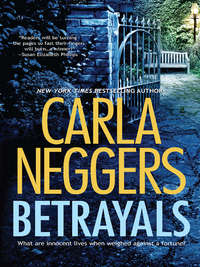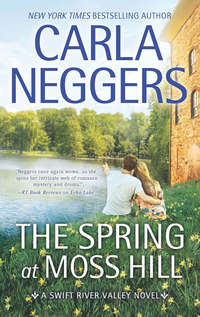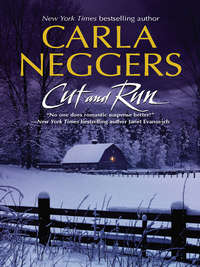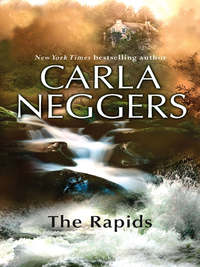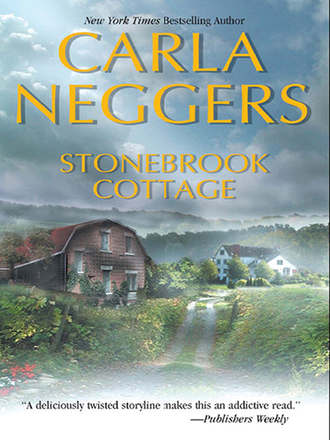
Полная версия
Stonebrook Cottage
“She was already there when I arrived around seven o’clock.”
“That’s eight in the east. We figure Parisi drowned sometime around seven.”
Sam could see Kara now in her little black dress, her dark hair pulled back with a turquoise comb that he’d tugged out later, threading his fingers into her thick waves of hair even as he warned himself to leave while he still could.
“Aren’t you from San Antonio?” Zoe West asked.
“Detective West, I’m not seeing the point here.”
She made a clicking sound, as if she was thinking. “San Antonio’s about ninety miles from Austin, isn’t it?”
“Yes, ma’am.”
“What?”
“I said, ‘Yes, ma’am.’”
“Are you being sarcastic, Sergeant Temple?”
“No, ma’am.”
“People only call me ma’am when they’re being sarcastic.”
He almost smiled. “All right, Detective West. I won’t call you ma’am.”
“It’s a southern thing, right? The ma’am?”
Sam realized she was serious. “I like to think of it as a manners thing.”
“Oh. Well, yeah, I guess. Okay, back to this gallery. It’s in Austin, which is about ninety miles from San Antonio. It has reduced hours during the summer while the owners—Kevin and Eva Dunning—are at their summer place on Lake Champlain, but they came back special because this was the only time they could get Gordon Temple. Right so far?”
“Right so far,” Sam said, careful to avoid any hint of sarcasm. He’d let Detective West ask her questions. Why not? He might learn something about Kara and why she’d acted the way she had that night.
“The Dunnings are the in-laws of another Texas Ranger, a lieutenant, Jack Galway. He’s Kara Galway’s brother. Your superior, right?” West paused, adding, matter-of-fact, “This was all pretty easy to find out on the Internet. I read a couple articles about that business in the Adirondacks last winter. You got shot, didn’t you, Sergeant?”
Sam didn’t answer right away. Zoe West had done her homework. In February, he’d gone up north to help Jack sort out a murder investigation that had ended up involving Jack’s wife and twin teenage daughters. They’d done snow, ice and bitter cold, and Sam swore he’d never complain about the heat again. And, yes, he was shot.
Kara had slid her fingertips over the scar on his upper thigh.
Damn.
“It was just a flesh wound,” he told the Connecticut detective.
“The Galways are doing okay now?”
“Yes.”
“Gordon Temple’s a famous Native American painter—Cherokee, lives in New Mexico. You any relation?”
“That’s irrelevant, Detective.” But he’d spotted Gordon Temple that night and remembered the black hair streaked with gray, the dark eyes and muscular build that were a lot like Sam’s own.
Zoe West paused a beat. “So you were there, what, for the art?”
Now who was being sarcastic? Sam watched an overweight man with tattoos on his upper arms carry a bag of food to a big rig. He tried to picture the Bluefield detective in her small-town Connecticut police station.
“Okay, so why you were in Austin is beside the point,” she said. “Governor Stockwell called Ms. Galway shortly after seven your time. Did you see her take the call?”
“Yes. We left together about ten minutes later.” Sam had never talked to Gordon Temple, never complimented him on his paintings or said, “Oh, by the way, I’m your son.” He shifted, losing patience. “Detective West, you’re on a fishing expedition. I have things I need to do.”
She made another couple of clicking sounds. “All right, here’s the deal. Kara Galway is one of a very few who knew Governor Parisi couldn’t swim. She told you that, right?”
Sam didn’t answer.
“Oh. I guess it didn’t come up over coffee, huh? If someone wanted him dead and tossed the bluebird into the pool deliberately, hoping he’d fall or seeing to it he did—well, they’d have to know he couldn’t swim.”
“Stupid way to kill someone.”
“It worked. He’s dead. And it looks like an accident.”
“Maybe it was an accident.”
“Too many accidents around here for my taste,” Zoe West said.
Sam sat up straighter, hearing something in the Bluefield detective’s voice he recognized, maybe just because he was in the same line of work. “There’s been another accident?”
“You didn’t hear? Allyson Stockwell and her two children had a close call during a Fourth of July bonfire at her mother-in-law’s place here in town. A gas can exploded. Someone left it too close to the fire. No one’s owned up yet, of course.”
“Injuries?”
“Not from the explosion itself. A local guy—Pete Jericho—shoved Mrs. Stockwell and the kids out of the way just in time. He had some minor cuts and bruises. Scared the hell out of everyone.”
“Governor Parisi was there?” Sam asked.
“He was. What if someone tried and failed to arrange a fatal accident for him that night, then tried again and succeeded a few weeks later?”
“Is that your theory, Detective?”
“Just the sort of question to keep a law enforcement officer up nights, don’t you think, Sergeant?”
“What about the state investigators?”
“They say they don’t want to speculate. Hey,” she said suddenly, “I’m supposed to ask the questions.”
Sam wasn’t fooled. Zoe West wanted him to have this information or she wouldn’t have given it to him. She might not have wide experience as a small-town detective, but she obviously wasn’t stupid.
“I guess it’s easier to call the explosion a backyard accident,” she went on. “Same with Big Mike and his injured bluebird. I mean, I know he was a nut about bluebirds and everything, but wouldn’t you think he’d be careful scooping one out of the drink when he knew he couldn’t swim? I would.”
“He could have lost his balance.”
“Could have.” She took in a breath. “Thanks for your help, Sergeant Temple. Keep my number handy if you think of anything else.”
Sam promised he would, and she hung up.
He sank back against his seat and shut his eyes a moment, the fatigue crawling at him. He was ten minutes from Jack’s house. He could stop in and have a cold beer and not mention Zoe West’s call, then head home and sleep.
But that wouldn’t be smart. Jack was protective of his entire family, his little sister no exception. Bad enough Sam had slept with her—now he’d just hung up with a Connecticut detective checking out Kara’s story from that night. Best to keep some distance between himself and Lieutenant Galway, at least, Sam thought, until he’d sorted out just how pissed he was at her.
Kara knew Mike Parisi couldn’t swim. His big secret. She was at the Dunning Gallery when he was falling into his swimming pool and therefore couldn’t have been in Connecticut killing him.
Theoretically, she could have hired someone to kill her governor friend. He doesn’t know how to swim. Get him to the deep end of his pool. Make it look like an accident.
But that didn’t fit with what Sam knew about the Galway character, and as far as he could see, she had no reason to kill the guy. It was more plausible, but still unlikely, that she could have inadvertently told the murderer Parisi couldn’t swim. Zoe West would want to know if Kara had kept her governor buddy’s secret—maybe she’d already asked, when the two of them talked. Kara obviously hadn’t seen fit to tell Sam about her conversation with the Bluefield detective or that she’d given Zoe West his number.
He swore under his breath. He didn’t believe Kara had anything to do with Parisi’s death, but she should have told him about it at some point before he’d left her house that Sunday—preferably before they’d landed up in her bed.
She damn well should have told him she was among a chosen few who knew Michael Parisi couldn’t swim.
Sam didn’t like being anyone’s alibi.
Two
F or the first time in weeks, Allyson Stockwell felt almost normal. The late-afternoon shade soothed her taut nerves as she swung gently on a hammock strung between two maple trees on Stockwell Farm in Bluefield, deep in the Litchfield Hills of northwest Connecticut. The taste of her iced tea, the smell of her mother-in-law’s roses, the sounds of birds in the nearby trees—all of it seemed so blissfully normal.
She felt like such a phony. She’d never lusted for power and title. She’d been content as lieutenant governor, half believing people when they said Mike Parisi had urged her to run only because she was Lawrence’s widow and he needed the Stockwell name behind him.
No…I won’t think about that now.
She’d had a postcard that morning from Henry and Lillian in Texas. They seemed to be enjoying themselves at the dude ranch. She felt good about her decision to send them. She wanted them to carry on as normally as possible as they adjusted to all the changes in their lives. Big Mike had been an enormous, charismatic presence in so many people’s lives, her children’s included.
If not for Lawrence, Allyson wondered, would she ever have met Mike Parisi? He and her husband were such unlikely friends—Lawrence, the Connecticut blueblood, and Big Mike, the self-made man from a working-class neighborhood—but they’d suited each other. Lawrence, dedicated to public service, preferred to work behind the scenes and appreciated Mike’s passion and drive, just as Mike had appreciated his wealthy friend’s genuine concern for the people of his state.
Twenty years older than Allyson, Lawrence was just forty-seven when he died ten years ago. She never thought she’d make it without him. She didn’t lack for anything material, just for the man she’d fallen in love with at twenty-one. Use your law degree, Big Mike had told her. Use your brain. Don’t wither away. Do something.
She had, and now she was governor. And alone again, on her own with so many responsibilities. Children who needed her, grieving friends, a grieving state.
She breathed in the warm, clean summer air. She hadn’t been out to Bluefield since Mike’s death. Lawrence had grown up out here on Stockwell Farm, the sprawling estate set amidst rolling hills and fields that his grandfather had purchased and expanded. His mother still lived here, but, as was the case with Allyson, Stockwell Farm would never be hers. Madeleine Stockwell could live in the white clapboard, black-shuttered house for as long as she chose—no one could throw her out but it and the grounds, all of Stockwell Farm, were held in trust for Lawrence’s children.
Allyson had never wanted the main house. She and Lawrence had converted the barn on the edge of the fields, and she continued to take Henry and Lillian there. Allyson thought they liked it better than the main house. The barn, too, would go to them. But Stonebrook Cottage, across the fields and through the woods from the main grounds, was Allyson’s and Allyson’s alone, a bit of Stockwell Farm that Lawrence had carved out for her. She liked having it for guests but planned to leave it to her children, too.
Once they got back from Texas, they’d all move into the Governor’s Residence in Hartford. Henry and Lillian would continue to attend their school in West Hartford, and Allyson had no intention of getting rid of their permanent home there.
At least the kids were having fun at the dude ranch. They loved it out at Stockwell Farm and would have liked nothing better than to run loose there all summer, but that was out of the question. Madeleine wouldn’t stand for it. Allyson remembered Lawrence telling her how his father had fancied himself a gentleman farmer and had horses and apple trees and gardens. He would have Madeleine and Lawrence cart jugs of water from a spring in the woods just so they’d know where it was and how to do it. He wanted them to be self-sufficient, capable, never helpless or idle.
When Lawrence was eight, Edward Stockwell cut his femoral artery with an ax and bled to death before his wife could get him to a doctor. Madeleine remarried three years later, beginning a string of marriages that ended with her divorce from her fourth husband five years ago. She vowed never to take another. Allyson believed her mother-in-law when she said that if Edward had lived, the two would have grown old together.
What a horrible blow to lose Edward’s only child to cancer ten years ago.
Now Lawrence and Mike both were dead, Allyson thought, and she was governor.
I don’t want to be governor.
It complicated everything. She had secrets of her own she wanted to protect.
Her heart raced, and it felt as if someone were standing on her chest. Her doctor was encouraging her to learn stress reduction techniques. Kara had dragged her to a yoga class last year before she left for Texas and demonstrated a simple breathing technique she used before trials. Allyson tried to remember it. In through the nose to the count of eight…hold for eight…out for eight…
She got to four and coughed, nearly dumping herself out of her hammock.
Her cell phone rang, almost paralyzing her. She’d forgotten she’d left the damn thing on, but since it was the number Henry and Lillian would use to call her she hated to turn it off. She sat up, her blond hair snagging in the knotted rope as she threw her legs over the side and groped for her phone in her canvas bag. With Mike’s death affecting them so deeply, the children’s counselors at the dude ranch had agreed to let them call home more often than was ordinarily permitted.
Allyson anchored herself with her feet and fumbled for the right button on her cell phone. It might not be that sick jackass who’s been calling.
But it was. She could tell by the quick intake of air on the other end. “Ah, Governor Stockwell. You like the sound of it, don’t you? What would the people of Connecticut think if they knew the truth, hmm? Their slut governor, screwing her working-class ex-con in secret. Do you think they might wonder if Big Mike had found out?”
Click. The call was over, the voice was gone.
Allyson shook. She’d never said a word to the caller. Never. She didn’t want to do anything to encourage another call or escalate the harassment into action. She just wanted the calls to stop. Each time she received one, she tried to convince herself it was the last.
The first one had come a few days before Big Mike’s death. Ye shall reap what ye sow. That was it. She’d dismissed it as a crank call, political harassment, nothing worth mentioning to anyone, never mind Mike or her security detail. Then, after Mike’s funeral, she received another one. Do you really think you can keep your ex-con lover a secret now?
And she knew. Someone had found out about her and Pete Jericho.
Pete was the salt of the earth, a man of the land. His family had owned the two hundred acres on the south border of the Stockwell Farm for generations. They used to be dairy farmers, but now they sold cordwood and Christmas trees, and for the past three years had worked a gravel pit. They plowed driveways and built stone walls and managed their rich neighbors’ properties, the mini-estates that had sprouted around Bluefield.
Pete had served six months in prison eight years ago for a stupid barroom brawl that should have been settled, and stayed, among friends—he wasn’t anyone’s idea of an ex-con. Yet Allyson had kept their affair a secret, begging the question of what she thought of his past. He’d undoubtedly saved her life—her children’s lives—when the gas can exploded during the Fourth of July bonfire. She could still feel his strong arms around her, his body covering hers, as she’d tried to protect Henry and Lillian from the blast.
Somehow an illicit affair with Pete Jericho was different now that she was governor. The anonymous calls didn’t make figuring out what to do about him any easier.
Mike had known. He’d given her an ultimatum a few days after the near disaster at the bonfire. He wanted her relationship with Pete out in the open or over and done with. No secret affairs. Period.
“But what will people say?” she’d asked.
“What the hell do you care? We’re not talking about your position on capital punishment or gay marriage. We’re talking about who you love. You do love the guy, right?”
“Yes, but—”
“But what? He served six months in the pokey for a bar fight.” Big Mike had laughed, amazed. “Come on, Allyson. People’ll be thrilled you’re not just another rich, watery-eyed WASP.”
She hadn’t taken that very well, but Big Mike loved to tease—it didn’t matter who. Kara was the one who could always give it right back to him. Allyson had enjoyed watching the two of them. She was more reserved herself, more formal by upbringing and temperament. Kara was a Texas hard-ass with a big heart, a combination that’d probably get her hurt one day.
But Mike hadn’t been teasing that day. He could be judgmental, calculating when it came to political advantage and appearances.
Did her caller know about the ultimatum? Would he—or she—try to make people wonder if she’d had something to do with Big Mike’s death?
What did the bastard want?
She jumped to her feet, knocking over her canvas bag, the contents spilling into the cool shade. She saw a state trooper, a woman, make a move toward her and waved her off. The special unit in charge of guarding the governor had come under heavy criticism for “letting” Big Mike die. Allyson had defended them. She knew what Mike could be like. He’d told her countless times he’d never get used to people hovering.
She squatted down, scooping up her wallet and Rolaids and Palm Pilot, three tubes of the same shade of lipstick. She was shaking uncontrollably now, crying. Ridiculous. She was overreacting to the cryptic phone calls, reading into them something that wasn’t there. There was no real threat, and harassment was part of being in the public eye. Even if she mentioned the calls to her bodyguards, what could they do? The caller hadn’t even made a request for any action one way or another on her part. Get rid of Pete, keep him. Tell the world, don’t tell the world. Give money, support a particular piece of legislation—nothing. Maybe the calls were designed to soften her up—maybe they were just to get under her skin.
“Allyson!”
Hatch Corrigan ran across the shaded lawn toward her. Lawrence’s half-brother was always on the move, a hothead like his father, Frank Corrigan, Madeleine’s third husband, whose early success as an actor hadn’t panned out the way either one of them had hoped. Madeleine raised their son largely on her own—she hadn’t wanted Frank’s help after their divorce. Hatch and Lawrence both had their mother’s rangy build and sharp nose, but Hatch had his father’s clear blue eyes, auburn hair and dimpled chin, his notorious flair for drama. Hatch, though, was content to remain behind the scenes, like his older half-brother. Not Frank, who’d wanted the stage and an audience, but died five years ago when he fell off scaffolding in a rundown off-off-Broadway theater, dead drunk.
Hatch didn’t stand to inherit a dime of Stockwell money, but Allyson couldn’t remember him ever complaining about it. His mother had some wealth to hand down, but not a lot, not compared to her first husband’s family fortune. Hatch loved Stockwell Farm and spent as much time as he could with Madeleine at the main house, when he wasn’t cooking up political schemes and gathering information, plotting, strategizing, advising. He’d been indispensable to Big Mike and, now, to Allyson.
He slowed slightly as he approached her hammock. It wasn’t uncommon, she thought, to see Hatch Corrigan in a rush, grim-faced and focused.
She grabbed on to the edge of the rope hammock and pulled herself to her feet, brushing away her tears. In time she might come to feel like a governor, but right now she felt like the thirty-seven-year-old mother of two middle-schoolers, a widow who could never again have romance in her life.
“Allyson,” Hatch repeated, breathing hard when he reached her. “We have a problem. That damn dude ranch in Texas just called. The kids—”
“Hatch!” She clenched his upper arms, her chest constricting, her knees going out from under her. “What’s happened? What’s wrong? Henry and Lillian—they’re okay, aren’t they?”
“Let’s hope.” His expression hardened, reminding her that he was forty-seven and childless, not a man who got along easily with children, even his only niece and nephew. “They took off on their own this afternoon. They’re on the loose somewhere in Texas.”
Susanna Galway called Sam at home, waking him up, and invited him to dinner, refusing to take no for an answer. He didn’t argue. Under the circumstances, showing up for dinner would be less provocative than not showing up. He buttoned his shirt, pulled on his boots and headed out.
Dinner was hell. He hated hiding anything from his friends, but if Kara hadn’t told her brother and sister-in-law about her weekend with Sam, he didn’t feel it was his place to open his damn mouth. He was being a gentleman, he decided, not a coward. It wasn’t as if he’d taken advantage of her. Kara Galway was in her thirties, and she’d wanted their night together as much as he had.
Jack, his wife and their twin daughters didn’t seem to notice he was suffering. Susanna was a slim, graceful, dark-haired, green-eyed financial whiz who’d tried to keep millions and a murderer showing up in her kitchen a secret from her Texas Ranger husband, not that there was keeping anything secret from Jack Galway, something that Sam knew he should keep in mind. Susanna was smart, and she liked her secrets. In her own way she was as protective of her family as Jack was. All four of them had come close to losing each other in a harrowing experience in the Adirondack woods six months ago. These days, Susanna seemed content with her work and her life in San Antonio. She was redecorating their suburban home and restoring a historic building downtown that nobody quite knew what she’d do with—including, apparently, her.
The twins were getting ready to head to college in a few weeks. Maggie had decided on Harvard, following in her father’s footsteps, Ellen on the University of Texas, which she liked to say was following in the footsteps of no one in her family.
They didn’t bring up the subject of Kara tonight, but Sam knew they all had welcomed her move back to Texas, teased her about losing some of her accent during her years up north. They expected her to take up with another lawyer or a University of Texas professor, maybe one of the artists who hung out at the Dunning Gallery. Not a Texas Ranger. Not Sam.
He hadn’t taken up with her, he reminded himself. He’d slept with her that one night and one morning two weeks ago.
After dinner, Susanna and Jack made espresso using the espresso machine Maggie and Ellen had given their father for Christmas. The girls retreated to the family room to watch television. Whatever the lingering effects of their ordeal this past winter, the twins were handling them, just a couple of high-school graduates excited about college.
Susanna handed Sam a tiny white cup and saucer and eased onto a chair at the new, glass-topped table. She smiled over the rim of her own steaming cup, which didn’t look out of place in her slender fingers. “You look as if you’re afraid you’ll break the china. Relax, Sam. You like espresso, don’t you?”
“I can drink it.”
Jack downed his espresso in about two sips. He was one of the finest law enforcement officers Sam knew, a big, broad-shouldered man, a Harvard graduate, a dedicated Texas Ranger who tried to maintain a precarious balance between work and family. He was fifteen and his sister just nine when their mother was killed in a car accident. Sam knew some of the details. How mother and daughter had gone out shoe shopping and were hit broadside on the driver’s side by a speeding delivery truck.
Kara had had to sit still, covered in shattered glass, splattered with her dying mother’s blood, until the paramedics could get her out. She’d suffered only minor physical injuries. After the accident, her father had encouraged both her and Jack to stay busy and excel, apparently believing the less time they had to think about their mother and grieve, the better. At eighteen, Kara headed north to Yale, not to return until last year.






